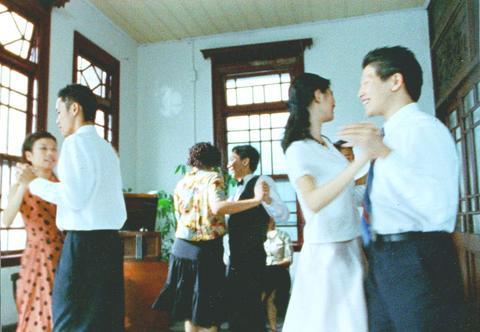Some of the salient features of Taiwanese-language pop songs are abundant sentimentalism, dense laments and sad stories about life, which are reflected in both the lyrics of many of the songs as well as the syrupy vocals.
Sadness is also a word that is often used to describe Taiwan's recent history, its days as a colony, the war, the 228 Incident and the White Terror, among other travails. Many Taiwanese recall a sad past and forget that during the 1930s and 1940s it was completely a different picture.

PHOTO COURTESY OF CHIEN WEI-SSU AND KUO CHEN-TI
Director Chien Wei-ssu (
"I've always thought that Taiwan's history is filled with sadness. But we've found out that there were times of jollity and youthfulness," Chien said.
Viva Tonal is a documentary tracing the emergence of Taiwan's record industry, as well as its pop songs. Through the music of Taiwan's earliest vinyl records and antique phonographs (provided by music collector Lee Kun-cheng (
The 1930s and 1940s were a time of big bands, ragtime jazz and ballroom dancing. Fashionable people would sit along boulevards drinking coffee, dancing the waltz and the fox trot, or just listening to their phonographs.
The lyrics to a Taiwanese-language song of the time, A Dance Era encapsulates this feeling: "We are the modern girls, free to go where we like/We don't have a care, don't know much about the world/We only know that these are modern times, and we should be sociable/Men and women in two lines, dancing the fox trot is my favorite."
Released in 1929, the song is up-beat and suitable for a fox trot. It was sung by Chun-chun (
The filmmakers interviewed old singers for their film, including Ai-ai (
The Columbia Record Company of Japan set up its Taiwan branch in Taipei's Ximenting in 1929 and hired local songwriters to publish Taiwanese-lang-uage records. Soon, Victor Records also set up a Taiwan branch.
As a result, perhaps, local people's recreational habits gradually changed from going to temple fairs or local operas, to listening to records and going to dances.
Woven into the narrative of the documentary is the rapid modernization which Taiwan experienced during these times, with the introduction of railways, electricity and running water. Men cut their queues and women stopped binding their feet. Such a new social atmosphere is reflected in the lyrics of A Dance Era.
Viva Tonal, which roughly means "great local sounds" in Italian, was printed on the old Columbia records. As for the film itself, it offers vivid images of Taiwan's history. The only criticism is that it could be tighter, as the narration of the history is a bit stodgy.
But the film does convey an image of happier times. Former president Lee Teng-hui (
Film Notes:
Directed by: Chien Wei-ssu and Kuo Chen-ti
Running time: 104 minutes
Taiwan Release: May 15, with a special English-subtitled screening on Wednesday, May 26, 10pm at the President Theater in Ximending

Towering high above Taiwan’s capital city at 508 meters, Taipei 101 dominates the skyline. The earthquake-proof skyscraper of steel and glass has captured the imagination of professional rock climber Alex Honnold for more than a decade. Tomorrow morning, he will climb it in his signature free solo style — without ropes or protective equipment. And Netflix will broadcast it — live. The event’s announcement has drawn both excitement and trepidation, as well as some concerns over the ethical implications of attempting such a high-risk endeavor on live broadcast. Many have questioned Honnold’s desire to continues his free-solo climbs now that he’s a

Lines between cop and criminal get murky in Joe Carnahan’s The Rip, a crime thriller set across one foggy Miami night, starring Matt Damon and Ben Affleck. Damon and Affleck, of course, are so closely associated with Boston — most recently they produced the 2024 heist movie The Instigators there — that a detour to South Florida puts them, a little awkwardly, in an entirely different movie landscape. This is Miami Vice territory or Elmore Leonard Land, not Southie or The Town. In The Rip, they play Miami narcotics officers who come upon a cartel stash house that Lt. Dane Dumars (Damon)

As Taiwan’s second most populous city, Taichung looms large in the electoral map. Taiwanese political commentators describe it — along with neighboring Changhua County — as Taiwan’s “swing states” (搖擺州), which is a curious direct borrowing from American election terminology. In the early post-Martial Law era, Taichung was referred to as a “desert of democracy” because while the Democratic Progressive Party (DPP) was winning elections in the north and south, Taichung remained staunchly loyal to the Chinese Nationalist Party (KMT). That changed over time, but in both Changhua and Taichung, the DPP still suffers from a “one-term curse,” with the

Today Taiwanese accept as legitimate government control of many aspects of land use. That legitimacy hides in plain sight the way the system of authoritarian land grabs that favored big firms in the developmentalist era has given way to a government land grab system that favors big developers in the modern democratic era. Articles 142 and 143 of the Republic of China (ROC) Constitution form the basis of that control. They incorporate the thinking of Sun Yat-sen (孫逸仙) in considering the problems of land in China. Article 143 states: “All land within the territory of the Republic of China shall